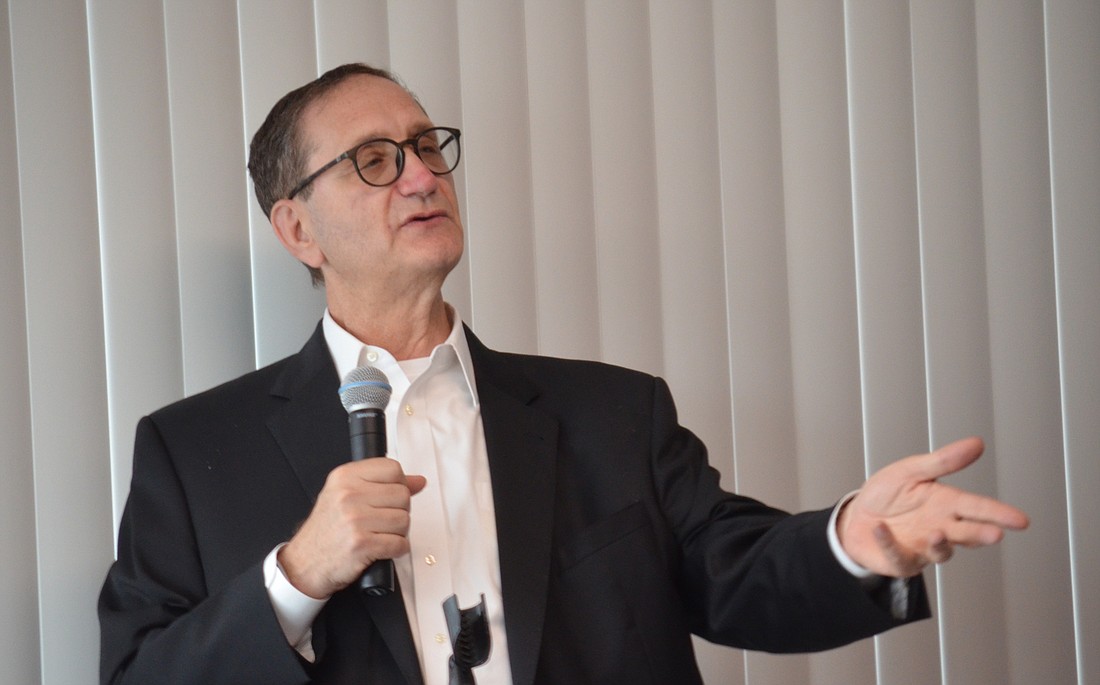- November 13, 2025
-
-
Loading

Loading

It's a lot like a watching a cross-section of parishioners when the collection basket makes its way back and forth through a church.
Some give more than others, Eric Kaplan says, but almost everyone gives something. And in return, they get the same satisfaction, whether they parted with a $50 bill or spare change.
"It's our experience,'' the co-trustee of the Louis and Gloria Flanzer Philanthropic Trust told a room packed with representatives from social-service agencies from around Sarasota on Friday afternoon, "that if everyone, even those who are needful, feel good about doing good, whether it's a dollar or 2 or 5, they feel good about themselves, and we want to incentivize that.''
And that's exactly what the organization is doing in trying to close the gap left by public sources of funding that Kaplan said are increasingly harder to come by.
The trust has embarked on a campaign in 2020 that sets aside $500,000 to match dollar-for-dollar contributions between $5 and $500 for nonprofit agencies in the social service, social welfare, K-12 education and healthcare sectors. The trust will absorb all costs, including fees charged by PayPal or other administrative overhead.
The idea is based on getting more people involved in philanthropy than the traditionally well-heeled donors, Kaplan told the dozens of people in attendance at the trust's downtown campus.
"It works in politics, as Bernie (Sanders) said, and it needs to work here in the community where we can help the people we see every day,'' Kaplan said.
Kaplan, who rolled out the program alongside co-trustee Dr. R. Dean Hautamaki, said the Sarasota area can look far more successful than it is, with shimmering bay views, sailboats bobbing on its waters and gleaming towers framing its boundaries. But, he said, it's not hard to see the flip side.
"The need is immense,'' Hautamaki said. "It was kind of surprising to both of us growing up here in service that there was a great need at many levels. And so from a healthcare standpoint, when I look at people in a different view outside the hospital and outside the office, you know there are pressing needs for individuals not only who need healthcare but also need support with mental health.''
The program will not, at least from the outset, match funds aimed at organizations that primarily serve the arts. "I don't mean to denigrate the arts," Kaplan said. "You know, the arts do very well with the people who come down for the season and want to see their shows and hear their music and they do fulfill an important part of the fabric of the community, and I continue to encourage people to support them. Having said that, that was not Gloria Flanzer's mission.''
Donors can visit flanzertrust.org to begin the process. With a few clicks, they'll reach a screen at which that can either donate via PayPal or write a check to send through the mail. Also, donors will designate their choice of social agencies. The Trust will process the donation, pass it along to the charity with information about the donor and match the dollar figure. The charity then will contact the donor with a letter of thanks, acknowledging the transaction and the match.
When the initial $500,000 is exhausted, Kaplan said the Trust will look at where it goes next.
"We'll consider increasing the funding then and reaching out to the partners, perhaps, to get them involved as well,'' he said. "You know, this is all a collaborative thing. We want to get the neighbors involved in the community. Well, we also would love to get other funding.''
Kaplan urged the representatives attending Friday's meeting to consider adding a link to their own organizations' donation websites to make the connection to the Trust smoother. He said goal is to involve donors with smaller sums, who might not traditionally have donated previously, rather than encouraging large donors to simply make numerous smaller donations for the purposes of the matching funds.
"Now, we're not going to accept a $500 every day, 365 days,'' Kaplan said. "But if you want to, if you want to do $500 on a monthly basis, we'll match that. You know, the goal is to get the everyday person involved. $500 is a nice contribution. And I'm hopeful that the average contribution will be much lower than that, but there'll be lots of them because that tells our goal is hitting the right nerve, that we're energizing the public to help their neighbors can get the people involved in helping kids go to school with who lives next door. That's the real goal here.''